The Latest News and Updates
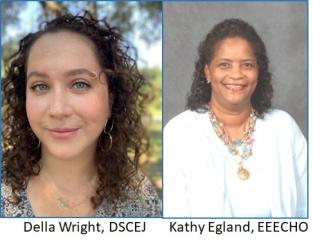
Aug 18, 2021
Bloomberg Fellow Spotlight: Della Wright
Della Wright, Evaluator and Assistant Director of the Childhood Wellbeing Division at the Deep South Center for Environmental Justice, is joined by Kathy Egland from EEECHO (Education, Economic, Environment, Climate and Health Organization), a CBO in Gulfport, Mississippi. In this episode, Della and Kathy discuss how their collaboration impacted the translation of COVID-19 data in Mississippi communities that have been historically impacted by air pollution and how they used that data to leverage resources for the community. (Click here to listen to podcast) To learn more about the Bloomberg American Health Initiative and the Bloomberg Fellows Program, visit https://americanhealth.jhu.edu/. ...
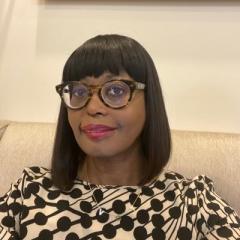
Aug 11, 2021
Disproportionate Air Pollution Exposure in African-American Communities
Dr Elica A Moss, at Alabama A&M University, explains the ongoing issue of disproportionate air pollution exposure in African-American communities in the US. Working with the Deep South Center for Environmental Justice, Dr Moss highlights an issue that is deeply influential on the health outcomes of African-American communities. When it comes to African-American communities, Governments have successively failed to tackle issues that cause ongoing, generational health issues. Now, with a global focus on air quality, climate change is at the forefront of discussions. Much like the Global South is taking the heaviest hit from air pollution, it appears that within the US, African-Americans are disproportionately suffering from air pollution exposure. Dr Moss explains that: “African Americans, people of color and those from low-income communities face many environmental issues in addition to air pollution exposure.” Read more ...
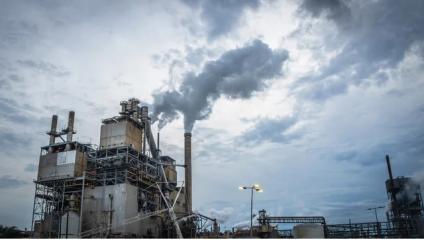
Jul 30, 2021
Good Jobs - The Unfinished Work of Environmental Justice
I’ll never forget the words of Emelda West, a small but mighty grandmother and activist from St. James Parish, La. It was in the late 1990s, and we had just worked together to stop the construction of a plastics plant in her hometown. West put her hand on my arm and said, “Dr. Wright, I just love you. I appreciate the work you’ve done to keep the poisons out of our community. But what we really need now are jobs for our kids.” In the last year, many Americans have awakened to the layered injustices faced by communities of color. There’s the routine harassment and violence at the hands of the police. The polluting facilities — from plastics factories to bus depots and coal-fired power plants — that always seem to land in our neighborhoods. The underfunded schools, inadequate health care, and, as West observed, the persistent and devastating lack of opportunity. In St. James Parish and across the country, our communities are coping with deep-rooted, multifaceted harms. Yes, we need to stop those harms from happening — by stopping the construction of new poison-spewing facilities, for example. But we also need to repair and revitalize the places we call home. It’s a complex challenge that calls for a holistic response. It calls for environmental justice. For years, the mainstream environmental movement focused on a series of separate issues — from saving the whales to reducing greenhouse gas emissions. The remedies were also narrowly targeted, through policy measures like cap-and-trade, for example, or techno-fixes like carbon capture and storage. Read more ...
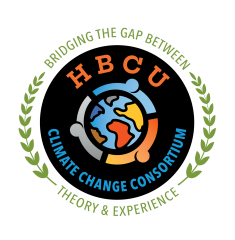
Jul 27, 2021
A Discussion With Members of the HBCU Climate Change Consortium
Interviews conducted by Payton Wilkins, DSCEJ Program Manager WTP In 2011, because of the urgent need to diversify leadership in the environmental arena, Dr. Robert D. Bullard and I, launched the Historically Black College and University Climate Change Consortium. The Consortium was conceived to help raise awareness about the disproportionate impact of climate change on marginalized communities to develop HBCU student leaders, scientists and advocates on issues related to environmental and climate justice policies, community resilience, adaptation and other major climate change topics—especially…. contd. Community Partner Spotlight Put the Womack On ‘Em We had the wonderful privilege of catching up with Major Joe Womack, Chief Executive Officer of Clean, Healthy, Educated, Saffe and Sustainable (CHESS) in Africatown Mobile, AL. We took the time to explore what motivates him and why he’s dedicated his retirement to the work of Climate and Environmental Justice. Major Womack also shares the most important lessons he’s learned leading CHESS. Q: What type of work does CHESS do? JW: We’re primarily an environmental action group for Africatown in Mobile, AL. We explore the nuances of political decisions on our lives. We fight against industry encroachment on the community and push back on industries that are taking advantage of the communities. Q: How did you get into Environmental Justice and Climate Justice? JW: I returned to Mobile in 1975 after serving in the military. I saw the environmental injustices in my community and said “Why don’t people do something?” I saw politicians lying on TV, but I didn’t do anything until retirement in 2008. In 2010 I got involved in community service. My mother always said “Don’t let them take my land.” My community involvement has picked up ever since. I formed partnerships strategically with groups, became really engaged civically and was attending all types of meetings. I started a Black vets organization, a county wide environmental group and now CHESS. With CHESS we fight for environmental justice within the Africatown Community only. CHESS was founded in 2017 with the leadership of Dr. Beverly Wright at the Deep South Center for Environmental Justice and Dr. Robert Bullard at Texas Southern University. CHESS became one of the 5 Gulf Coast underserved Community Based Organizations (CBO’s) that the HBCU-CBO Gulf Coast Equity Consortium selected to assist in resolving environmental justice and climate change problems. Q: If you could do it again, would you do anything differently? JW: I would’ve stopped believing someone else was going to solve the issues in my community. I wish I would’ve got started with this sooner. Q: Do you have any advice for folks that want to start a grassroots organization like CHESS? JW: You must have it within yourself that you’re not going to quit. People will follow you; and if they see you quit, they will quit too. People will sit back and wait for you to quit. You gotta know that you’re not going to quit. When you don’t know what to do, do the right thing. When you are right continue to fight, when you’re wrong, go home! As long as you do the right thing, nobody can argue with you. Oh, and keep good records. Keep good financial records, keep notes for meetings. Start out with your family and friends. If somebody quits, don’t say anything bad about them — they may come back. Alumni Spotlight From the Caribbean to the Classroom Simone English is a phenomenal human being. A few weeks ago we chatted with her from her Tallahassee living room. We learned a lot about her research and why she chose to focus on environmental justice and climate justice issues. Read the interview below for more insight. Q: What is your major at Florida A & M University? SE: I am completing my PhD. in Environmental Science. I am All But Dissertation (ABD). Q: Why did you choose Environmental Science? SE: I chose Environmental Science because my main goal is to understand why my community is suffering from natural disasters. I want to see how communities can prevent and survive natural disasters. Q: What advice would you like to share with others? SE: We all are a part of this entire system; people, animals, places are all a part of it. We have a role to play. And we should protect the earth because it keeps us alive. If we want clean water, food, and a good quality of life, we should protect Mother Earth. It doesn’t matter what field of study you’re in, we should care about Mother Earth. Q: What does Climate Justice look like to you? SE: Climate Justice for me is ending some of the repercussions of Environmental Justice, Environmental Racism, and colonialism. So basically, we can't have Climate Justice until we get reparations and some repair to our unhealthy environments. Therefore, collectively we can enjoy clean air, land, water and healthy food. Climate injustice is impacting the entire world and it's because of colonialism. There’s always one sect, white people, that is extracting economies, resources, and people that are not theirs and it’s more than they need. They continue to take what doesn’t belong to them. Until we have Black Justice there cannot be any other kind of Justice. Faculty Mentor Spotlight Climate, Culture, & Cosmos Interviewing the infamous Dr. John Warford was a pure pleasure. In this interview, Dr. Warford, drops gems on us. Insight from this celestial blessing stretches across academia and general life practices. Continue reading for an unexpected paradigmatic shift in your understanding of Environmental Justice, Climate Justice, and life. Q: What did you study in college? JW: Economic Geography Q: What led you to Economic Geography? JW: I’ve always been interested in a wide variety of subjects. I knew there had to be ways to teach interdisciplinary subjects together. Naturally, I was drawn to interdisciplinary subjects that don’t fit into one category. I was drawn to the larger areas of information; that includes history and geography. I was very fortunate, to have in the field of economic geography, a teacher that could translate that information. He had a leap because of the interdisciplinary approach. Q: What type of research have you been focusing on lately? JW: I have been exploring Environmental Justice (EJ) communication praxis and I have been examining various different forms of documents that have been produced in the movement for EJ. I’ve been converting these documents into creative ways of communication. Q: If you could do things differently, would you? JW: I got to try a lot of things, brother. No, I wouldn’t do anything differently. Knowing where I am now, is where I’m supposed to be. There’s a certain level of evolution to partake in human and earth science studies. So I would have started earlier if it were possible. Q: What advice do you have for folks that want to follow a similar path? JW: Each one has a unique path. Be an authentic person. Hopefully you do something you're passionate about. Your doing should spring from what you are becoming. To be an honest and authentic person you should excel in whatever you do. Avoid two things: all unhappiness can be summed up into two things: comparison and attachment. One must recognize that you have a life and you’re supposed to become something everyday in life. Everybody has something they will do to their perfection. Be the same all the way through. Don’t be distracted by the notion of imposter syndrome. The world knows what to do with them [imposters]. Learn to accept and be your authentic self because your spirit knows the truth. Be true to the path that’s in front of you because it's all about evolving as a person. Be aware of your faults and strengths. Q: What does Climate Justice look like to you? JW: It looks like human beings are living in harmony with nature and the cosmos. Nature equals planetary. Cosmos equals a larger level. There are principles and laws that I am going to deal with as it relates to the word justice. Our movement has to do with purpose. The way we move is in the harmony of the universe and nature. Our purpose is aligned with the universe and nature. Our function is more of a mental thing. How we function is based on balance and reciprocity and equilibrium. That's the natural thing we see and don't know. Justice, we’ve been made to see justice as something that someone gives us. Justice is how we teach others how to treat us. Nature and cosmos don't need anything from us. Nature doesn't have to do anything., We have to be good stewards of nature. That’s where justice for self begins. An Afrotopia is creating mechanisms and checks to balance nature. We have to do something with our function or purpose. Our purpose has been to emulate our function. But that's antithetical to our responsibility to develop a system that meets our needs. Culture and the order of behavior of our people must be in line with the cosmos of nature. Current Student Spotlight Scholar & Steward It’s no secret, Dillard University produces exceptional scholars, and just great human beings in general (some of the best). Sure, I may be a little biased (c/o 2014). But, that doesn’t take away from the great work Joy Semien has been doing. She’s a hard hitting scholar on a vanguard of research. Joy has been true to the cause since her beginning. Check out her story below. Q: What school do you attend, and what schools have you attended? JS: The illustrious Dillard University for undergraduate school, Texas Southern University for graduate school, and Texas A&M University where I’m currently enrolled in a PhD program. Q: What are you studying now? JS: Well, I’m a candidate. I’m writing on, and researching, organizational recovery and how they’re [organizations] recovering from natural disasters, and other disasters. I’m really focusing on businesses in southeast Texas. Q: What advice can you give to people that want to follow a similar path? JS: Do every internship you can find, because that’s how I figured out what I like to do and don’t like to do. Find positive mentors in your field, because they give you the most. Say “yes” to a lot of opportunities and learn when to say “no” to opportunities that don’t benefit your growth. Q: How did the HBCU Climate Change Consortium contribute to your success? JS: I think it was everything. It set me up to be ready for graduate school, to interact with different practitioners in my field. It was the baseline experience. It helped me get out of my shyness. It trained me to step into the next level — both academically and professionally. Q: What does Climate Justice look like to you? JS: People acknowledging that we have a problem. Having air and water that doesn’t kill us; that doesn't lead to long term illness. Respect trust and honesty. Self-determination to decide on the location of industry in proximity to our communities. A lot more respect. There’s clearly no respect for human life. They value dollars over people. People over profits. ...

Jul 26, 2021
City Council Races Must Tackle Issue of Regulating Entergy
The qualifying period has concluded for candidates seeking the office of New Orleans City Council. The responsibilities of council members cover a host of subject matter areas: criminal justice, housing, land use, sanitation, budgeting, transportation, and the environment, among others. Too often, candidates seeking the office of City Council do not talk about the extraordinary power of regulating Entergy, our city’s electric power utility. Elections come and go without so much as a statement by candidates on what they would do to lower the cost of Entergy bills, or how they would support energy efficiency and home weatherization. According to data kept by the US Department of Energy, more than half of New Orleans residents pay a high energy cost burden that’s as much as 28 percent of monthly income. In past council races, televised debates rarely question candidates on their plans for eliminating the frequent number of power outages that occur, rain or shine. Candidates developed platforms that did not connect, much less mention, New Orleans’ vulnerability to the climate crisis and our place in a region that is engulfed by industrial pollution. Voters seldom heard candidates share their vision for improving livelihoods and neighborhoods with equitable energy policies. Read more ...
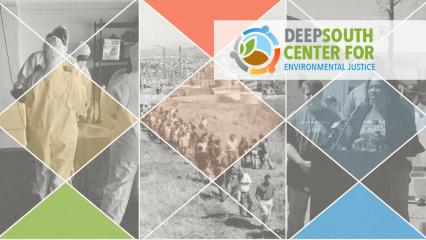
Jul 13, 2021
The Work, The Impact, The Opportunity
VIEW POWERPOINT The Deep South Center for Environmental Justice (DSCEJ) is dedicated to improving the lives of children and families harmed by pollution and vulnerable to climate change in the Gulf Coast Region through research, education, community and student engagement for policy change, as well as health and safety worker training for environmental careers. The DSCEJ provides opportunities for communities, scientific researchers, and decision makers to collaborate on projects that promote the rights of all people to be free from environmental harm as it impacts health, jobs, housing, education, and overall quality of life. The DSCEJ operates three programs: (1) Research and Policy Studies; (2) Community and Student Education, Training, and Engagement; and (3) Environmental, Health and Safety Worker Training. Navigate NOLA, a division of the DSCEJ, provides social emotional wellness programs for children and adults. The DSCEJ directs and manages the newly re-launched National Black Environmental Justice Network (NBEJN). ...
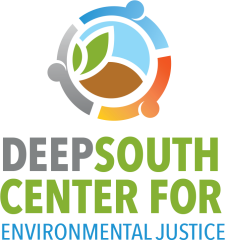
Jul 9, 2021
Network Coordinator Position
The Deep South Center for Environmental Justice is seeking an experienced Network Coordinator. About the Deep South Center for Environmental Justice The Deep South Center for Environmental Justice (DSCEJ) is dedicated to improving the lives of children and families harmed by pollution and vulnerable to climate change in the Gulf Coast Region through research, education, community and student engagement for policy change, as well as health and safety worker training for environmental careers. The DSCEJ provides opportunities for communities, scientific researchers, and decision makers to collaborate on projects that promote the rights of all people to be free from environmental harm as it impacts health, jobs, housing, education, and overall quality of life. The DSCEJ operates three programs: (1) Research and Policy Studies; (2) Community and Student Education, Training, and Engagement; and (3) Environmental, Health and Safety Worker Training. Navigate NOLA, a division of the DSCEJ, provides social emotional wellness programs for children and adults. The DSCEJ directs and manages the newly re-launched the National Black Environmental Justice Network (NBEJN). DSCEJ is seeking a Network Coordinator for NBEJN who is self-driven and detail-oriented with a demonstrated passion for justice and equity. This individual will report to the Executive Director of DSCEJ. Position The Network Coordinator will play a critical role in helping NBEJN achieve its vision to provide high quality program coordination for members. The Network Coordinator will be responsible for a variety of professional activities to build relationships, trust, and alignment with NBEJN members; coordinate working groups; design, coordinate, and implement campaigns; and conduct qualitative and quantitative evaluations of programs and activities. The individual will be counted on for clear communications, effective organizing and coordination with diverse members, achieving project goals and objectives, and positioning NBEJN and its membership for continued success. Key Responsibilities Oversee program implementation in coordination with the Leadership Team Assist members to grow their organizations and capacities Build strategic partnerships Support consistent and progressive steps toward sustaining NBEJN and achieving programmatic priorities Monitor the status of work plans and priorities derived from the strategic plan; and regularly communicate with DSCEJ staff on the status in order to effectively coordinate accountabilities, objectives, and associated budgets Develop a knowledge management system that ensures maximum sharing of information and learning throughout the organization and the NBEJN membership Specifically, the Network Coordinator will: Support the Leadership Team Maintain regular and effective communications with the NBEJN membership Schedule and organize meetings and events, as well as prepare and maintain agendas and minutes Ensure the implementation of policies and practices Communicate information and updates in a timely manner to the NBEJN membership Keep up-to-date on the plans and activities of the Work Groups, as well as maintain regular attendance at Work Group meetings Assist in developing a centralized information system Assist in disseminating communications to the media and on social media Create and regularly publish an NBEJN e-newsletter Facilitate opportunities for the NBEJN membership to have input on relevant federal and state policymaking Collaborate with DSCEJ staff on joint projects such as webinars, press conferences, etc. Help build positive relations between the Network membership and external parties Assist Network members in accessing communications technology (video conferencing, presentations, etc.) Organize and maintain NBEJN documents, records, photos, images, and videos Occasionally assist with the preparation of reports and proposals Qualifications Bachelor's degree required, graduate degree preferred; at least 6 to 8 years of professional experience in a general management role, preferably in a rapidly evolving institution Highly organized and ability to wear multiple hats in an ambiguous, fast-moving environment; a driving force who manages toward clarity and solutions A successful track record in setting priorities, shaping processes, guiding people and systems, and developing the infrastructure that creates a stronger and more efficient organization Thorough understanding of project management; able to work effectively under pressure to meet tight deadlines and challenging goals A consummate team player with a flexible and creative approach Excellent communication and coalition building skills with an ability to balance, negotiate, and work with a variety of internal and external stakeholders; high level of knowledge and understanding, especially as it relates to program replication, connecting programs to funding, creatively generating other resources, and building strategic partnerships Personal qualities of integrity, credibility, and a demonstrated commitment to NBEJN mission It is the policy of the Deep South Center for Environmental Justice to provide equal employment opportunities without regard to race, color, religion, sex, national origin, age, disability, marital status, veteran status, sexual orientation, gender identity, genetic information or any other protected characteristic under applicable law. HOW TO APPLY: Please email a detailed cover letter highlighting your interest, your resume and three professional references to beverlyw@dscej.org. Please include the Network Coordinator Position in the subject line. ...
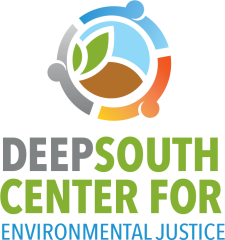
Jul 9, 2021
Developer/Grants Manager Position
The Deep South Center for Environmental Justice is seeking an experienced Developer/Grants Manager. About the Deep South Center for Environmental Justice The Deep South Center for Environmental Justice (DSCEJ) is dedicated to improving the lives of children and families harmed by pollution and vulnerable to climate change in the Gulf Coast Region through research, education, community and student engagement for policy change, as well as health and safety worker training for environmental careers. The DSCEJ provides opportunities for communities, scientific researchers, and decision makers to collaborate on projects that promote the rights of all people to be free from environmental harm as it impacts health, jobs, housing, education, and overall quality of life. The DSCEJ operates three programs: (1) Research and Policy Studies; (2) Community and Student Education, Training, and Engagement; and (3) Environmental, Health and Safety Worker Training. Navigate NOLA, a division of the DSCEJ, provides social emotional wellness programs for children and adults. The DSCEJ directs and manages the newly re-launched National Black Environmental Justice Network (NBEJN). DSCEJ is seeking a Developer/Grants Manager who is self-driven and detail-oriented with a demonstrated passion for justice and equity issues. This individual will report to the Executive Director of the DSCEJ. The Developer/Grants Manager is a new position. Key Responsibilities The Developer/Grants Manager will spearhead and build the development function as the DSCEJ continues to grow. This position is responsible for fundraising and development activities. The successful candidate will help forge new relationships to build the visibility, impact, and financial resources of DSCEJ. The Developer/Grants Manager will also design and implement a comprehensive plan for cultivating individual and philanthropic support. The Developer/Grants Manager will have primary responsibility for establishing and implementing the infrastructure for financial sustainability through the solicitation of major gifts, federal and state grants, special fundraising events, and corporate and foundation support. The Developer/Grants Manager will expand and diversify DSCEJ’s donor base/pipeline and work closely with team members to secure funding for new initiatives. In addition, the Developer/Grants Manager will work closely with the board of directors and support board members as they take on more active fundraising roles. Specifically, the Developer/Grants Manager will: • Develop and execute DSCEJ’s annual fundraising plan • Secure financial support from individuals, foundations, and corporations • Manage the use of the Raiser's Edge System • Develop and maintain ongoing relationships with major donors • Create and execute a strategy for a large sustained base of annual individual donors • Organize special events • Develop and track proposals as well as prepare reports for all foundation and corporate fundraising Qualifications • Bachelor's degree required, Master's preferred • At least five years of professional experience in a nonprofit organization; demonstrated success in a development function (managing and forging relationships with multiple donor sources) • Demonstrated excellence in organizational, managerial and communication skills • Knowledge of the Raiser's Edge System • Demonstrated experience in expanding and cultivating donor relations • Excellent communication skills, both written and oral; ability to influence and engage a wide range of donors and build long-term relationships • Strong organizational skills • Flexible and adaptable style; a leader who can positively impact both strategic and tactical fundraising initiatives • Ability to work both independently without close oversight, and as a team player who will productively engage with others at varying levels of seniority within and outside DSCEJ • High energy and passion for DSCEJ’s mission is essential • Ability to construct, articulate, and implement annual strategic development plan • Strong organizational and time management skills with exceptional attention to detail It is the policy of the Deep South Center for Environmental Justice to provide equal employment opportunities without regard to race, color, religion, sex, national origin, age, disability, marital status, veteran status, sexual orientation, gender identity, genetic information or any other protected characteristic under applicable law. HOW TO APPLY: Please email a detailed cover letter highlighting your interest, your resume and three professional references to beverlyw@dscej.org. Please include the Developer-Grants Manager Position in the subject line....
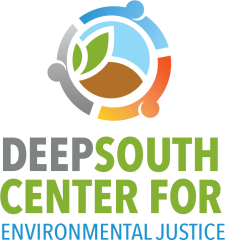
Jul 9, 2021
Communications Coordinator Position
The Deep South Center for Environmental Justice is seeking an experienced Communications Coordinator. About the Deep South Center for Environmental Justice The Deep South Center for Environmental Justice (DSCEJ) is dedicated to improving the lives of children and families harmed by pollution and vulnerable to climate change in the Gulf Coast Region through research, education, community and student engagement for policy change, as well as health and safety worker training for environmental careers. The DSCEJ provides opportunities for communities, scientific researchers, and decision makers to collaborate on projects that promote the rights of all people to be free from environmental harm as it impacts health, jobs, housing, education, and overall quality of life. The DSCEJ operates three programs: (1) Research and Policy Studies; (2) Community and Student Education, Training, and Engagement; and (3) Environmental, Health and Safety Worker Training. Navigate NOLA, a division of the DSCEJ, provides social emotional wellness programs for children and adults. The DSCEJ directs and manages the newly re-launched National Black Environmental Justice Network (NBEJN). DSCEJ is seeking a Communications Coordinator who is self-driven and detail-oriented with a demonstrated passion for justice and equity. This individual will report to the Executive Director of DSCEJ. Position The Communications Coordinator will set and guide the strategy for all communications, website, social media, as well as public relations messages and collateral to consistently articulate DSCEJ’s mission. The Communications Coordinator will work closely with program directors within the organization as the communications partner on a variety of strategic initiatives. Responsibilities Develop, implement, and evaluate the annual communications plan across the network's discreet audiences in collaboration with the DSCEJ team and constituents Lead the generation of online content that engages audience segments and leads to measurable action, as well as advise on who, where, and when to disseminate Put communications vehicles in place to create momentum and awareness as well as to test the effectiveness of communications activities Manage the development, distribution, and maintenance of all print and electronic collateral including, but not limited to, newsletters, brochures, and DSCEJ website Mentor and lead a team member responsible for DSCEJ website administration and coordination Coordinate webpage maintenance—ensure that new and consistent information (article links, stories, and events) is posted regularly Track and measure the level of engagement within the network over time Manage development, distribution, and maintenance of all print and electronic collateral including, but not limited to, newsletters, brochures, annual report, e-newsletters, and DSCEJ website Coordinate and organize annual meetings that engage the network's discreet audiences Manage all media contacts Organize and maintain an archive of DSCEJ communications, including photos, images, and videos Specifically, the Communications Coordinator will: Execute communications strategies and outreach materials for advocacy campaigns, signature events, and donor and supporter engagement. Items may include blog posts, press releases, Op-Eds, videos, social media content, and other items. Manage and regularly update content on DSCEJ Facebook, Instagram and Twitter. Create and manage the editorial calendar for website updates, newsletter content, social media posts and media pitches. Create a digital and traditional press kit that includes an organization backgrounder, program fact sheets, leadership bios, infographics, etc. Build and maintain positive working relationships with online, print and broadcast journalists; editorial writers and columnists; and opinion leaders. Regularly pitch news ideas to media that are aligned with DSCEJ program areas, signature events and thought leadership. Develop and implement a system to track electronic files, media lists, press clips, brochures, fact sheets, photos, images, videos, etc. Qualifications DSCEJ is seeking an accomplished Communications Coordinator who has at least 6 to 8 years of communications experience, ideally in an “in-house” leadership role within a complex (number and variety of constituents) nonprofit entity, and covering areas such as website content, newsletters, and donor communications. The ability to take knowledge, including scientific data, and transform it into impactful, accessible, and useful messages, and disseminate it to the right audiences through the best distribution channels is critical. Specific requirements include: • Highly collaborative style; experience developing and implementing communications strategies • Excellent writing/editing and verbal communication skills • A strong track record as an implementer who thrives on managing a variety of key initiatives concurrently • Relationship builder with the flexibility and finesse to "manage by influence" • High energy, maturity, and leadership with the ability to serve as a unifying force and to position communications discussions at both the strategic and tactical levels • Sincere commitment to work collaboratively with all constituent groups, including staff, board members, volunteers, donors, program participants, and other supporters • Self-starter, able to work independently, and entrepreneurial; enjoys creating and implementing new initiatives It is the policy of the Deep South Center for Environmental Justice to provide equal employment opportunities without regard to race, color, religion, sex, national origin, age, disability, marital status, veteran status, sexual orientation, gender identity, genetic information or any other protected characteristic under applicable law. HOW TO APPLY: Please email a detailed cover letter highlighting your interest, your resume and three professional references to beverlyw@dscej.org. Please include the Communications Coordinator Position in the subject line....
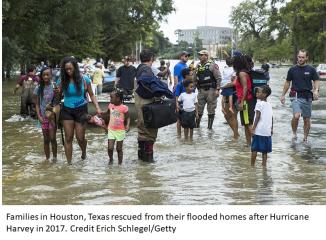
Jul 9, 2021
Five Ways to Ensure Flood-Risk Research Helps the Most Vulnerable
Miyuki Hino and Earthea Nance The year 2020 saw further devastating floods, caused by storms such as Cyclone Amphan in South Asia and a record-breaking hurricane season in the Atlantic Ocean. It is now clear that the changing climate is making coastal flooding more frequent, downpours heavier and storms wetter. Less appreciated is that the impacts of increased flooding are distributed unequally and unfairly. The greatest burdens fall on the most vulnerable. Global damage from floods and storms has been trending steadily upwards, from US$94 billion in the 1980s to more than $1 trillion in the 2010s, according to the emergency-events database EM-DAT (www.emdat.be). This increased economic burden is driven in part by changing climate patterns, alongside increased settlement and development in areas of higher hazard. Decades of research on environmental justice and social vulnerability have shown that the risks and impacts from flooding are disproportionately borne by marginalized households. Over the past few years, researchers have begun to quantify this effect. For example, from 1999 to 2013, white residents of US counties with extensive damage from natural hazards, including flooding, on average gained $126,000 in wealth over this period; Black and Latinx residents on average lost $27,000 and $29,000, respectively. Communities with higher incomes often receive more aid after disasters. Read more ...